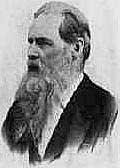 |
Cultural EvolutionismThe anthropological theory known as cultural evolutionism was a reflection of gradually changing attitudes and the increasing secularization within Europe from the 1500's to the 1800's. By the 1800's, many upper class Europeans (as well as Americans) were looking for scientific evidence of the past, and scientific explanations for cultural and physical diversity, instead of simply trying to interpret the Bible to answer such questions. In addition, many of these same educated Europeans believed that the degenerative view too often resulted in inhumane treatment of non-European peoples, while the alternative noble savage view was thought to be overly romantic. If in addition neither view had any scientific basis, they could both be discarded. One of these Europeans, an Englishman named Edward Tylor, is often awarded the term "father of anthropology".
Edward Tylor (1832-1917) Tylor was born in London, the son of Quaker parents. He left the family business as a young man in order to travel in hopes of improving his health. In the process, he developed a keen interest in other cultures, and his research and publications sparked an enormous interest in culture and anthropology. Tylor went on to publish a classic definition of culture (see lesson on culture) and to found anthropology as a discipline at Oxford University. Aided by the developing discipline of archaeology, he felt there was enormous evidence to prove that cultures never degenerated, but always "evolved", which to Tylor meant that cultures progressed. (For more on Tylor and the development of anthropology, and Tylor's idea of anthropology as an educational backpack, click here.) Tylor's evolutionism was a diachronic theory: it attempted to explain how cultures changed through time. Cultural evolutionism has three basic assumptions.
Archaeological evidence did indeed substantiate that human culture began as technologically simple foragers. Farming and eventually class stratification were later developments. However, evolutionism contains value judgments which are difficult to substantiate scientifically. Problems with cultural evolutionism include the following.
Because of the explicit ethnocentrism of cultural evolutionism, it is not accepted as a valid theory by cultural anthropologists today. However, the emphasis on scientific evidence to support a view of human cultural change, as well as other aspects of evolutionism, became incorporated in the theory known as cultural materialism, often called human ecology or the ecological model. In addition, the notion of history as progress became entrenched in the world view of most Europeans and Americans. The most important American cultural evolutionist was Lewis Henry Morgan. His work is covered in the next lesson.
|
